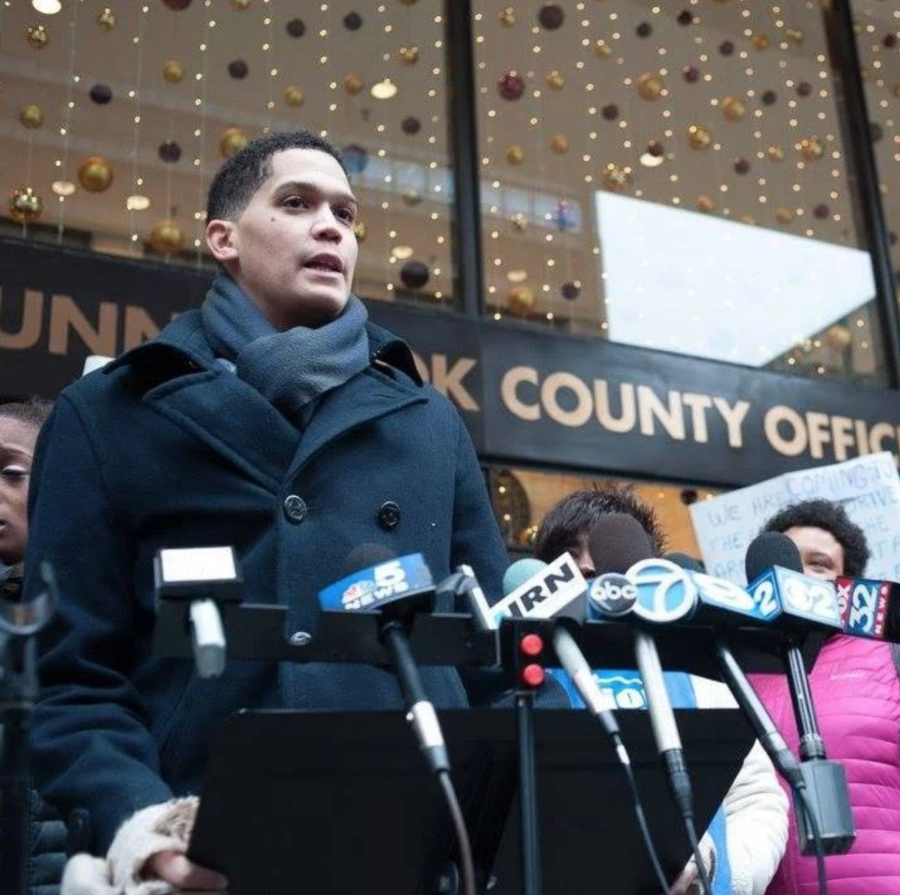Robert Peters’s schedule for the 2020 legislative session looks to be packed.
The state senator has been the chief sponsor on 33 separate bills since he took office in early 2019, after his appointment to replace newly minted state attorney general Kwame Raoul. These include the country’s first ban on private immigration detention centers, signed into Illinois law last June. Peters’s initiatives still underway are wide-ranging. His pending bills include a host of criminal justice reforms—most notably an end to cash bail—as well as new public health regulations, like a requirement to test water in public parks for lead contamination.
Peters is also the inaugural chair of the Senate’s new Special Committee on Public Safety, established this month. The committee will hear several bills on criminal justice, including Peters’s bill to eliminate cash bail. In his vision, it will serve as a welcoming space for testimony from reformers and criminal justice officials alike.
In his conversation with the Maroon Editorial Board, Peters was emphatic about the need to reframe these debates in terms of safety—a word which, he says, has become the exclusive property of right-wing rhetoric. “I don’t like to say the term ‘criminal justice reform,’” he said. “I prefer to talk about safety and public safety. We cede to the right on what it means to be a public safety champion.”
Listen to the Editorial Board's interview with Peters:
This interview is also available on Spotify.
“Criminal justice is great and dandy,” he continued, “but I think what people want is safety…. I don’t see why [former Republican Party strategist] Lee Atwater got to own that issue.”
For Peters, efforts to bolster public housing and health care, better fund public defender services, and reduce Illinois’s prison population all represent ways to redefine what “public safety” means: safety for everyone, including those ensnared in the justice system.
Peters’s criminal justice work encapsulates what most impresses us about his candidacy: During his short stint in office, he has continually leveraged his past as an organizer to his success.
In 2016, while serving as political director of the People’s Lobby and Reclaim Chicago, Peters helped found the Coalition to End Money Bond. As a state senator, he continues to work closely with the Coalition to champion its namesake objective. Peters’s organizing experience has also given him close ties to activist group Chicago Votes, and he is fiercely supportive of their proposal for a constitutional amendment to enfranchise Illinois’s incarcerated population. “If you’re incarcerated and you’re able to vote, your treatment inside of a prison improves exponentially, because people know there’s an accountability there,” he told the Editorial Board. “There’s also the sense that you’re now an enfranchised human with rights.”
Peters’s activism also regularly brings him to campus. He meets often with UChicago Student Action, and he has spoken with University President Robert Zimmer in Levi Hall. A Hyde Park native, he stressed his intimate familiarity with University history as an asset in his talks with administrators over University-led development. Discussing the impetus for a bill he plans to introduce on police responses to mental health episodes, Peters cited the shootings of Charles Thomas by UChicago police and Myles Frazier by SWAT officers, as well as students’ #CareNotCops campaign. The bill would require a social worker to accompany police as part of the first response team for individuals experiencing a mental health crisis.
Peters’s sole challenger, lawyer Ken Thomas (J.D. ’16), is a commendable candidate in his own right. In particular, his proposed legal protections for tenants, informed by his years of pro bono work on eviction cases, would bring a much-needed dose of fairness to a housing court system currently stacked in favor of landlords. Thomas’s campaign, however, hasn’t argued that Peters has failed to do enough to protect tenants. Instead, he has focused on the closed-door appointment process that gave Peters his senate seat. Thomas also charges that Peters’s acceptance of corporate donations undermines his anti-corruption activism.
We agree with Thomas that the undemocratic appointment process was a less-than-ideal way to fill Raoul’s vacancy. We feel, however, that this is overwhelmingly outweighed by Peters's energetic first term. We also don’t find that Thomas’s allegations of corporate cozying hold much weight. Peters’s donations from companies like AT&T, Comcast, and Verizon are dwarfed by his support from organized labor. His top donors include, for example, the Illinois Laborers’ Legislative Committee, the Chicago Teachers Union, and the Chicago Journeymen Plumbers, among other unions.
Furthermore, Peters’s opposition to the political objectives of energy and telecommunications companies strikes us as genuine. Peters was an early cosponsor of the Clean Energy Jobs Act, one of the country’s most progressive pieces of environmental legislation. If passed, it will reform electricity markets, promote energy efficiency and storage, and create jobs in the renewable energy sector. In his discussion with the Editorial Board, Peters described the law’s potential to link “union jobs to climate justice,” allowing environmental action to also address racial and class disparities.
Robert Peters has earned the time needed to carry through his ambitious legislative agenda. The Chicago Maroon enthusiastically endorses him for state senator.









